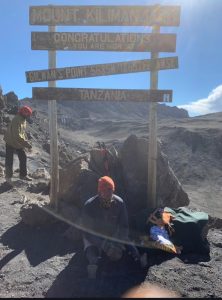Invictus Medallist James Rose: “I Climb Mountains To Keep Me Sane”

In 2009, 22-year-old James Rose had both legs completely blown off by an IED in Afghanistan. Such an ordeal would knock most people for six, and he was no exception.
Rose, now in his mid-30s, can glance over to two Invictus Games medals sitting on his mantlepiece. He can also declare himself the first double above-the-knee amputee to climb 6,000-meter Mount Kilimanjaro.
From the outside, it seems that an unfathomable tragedy has given way to an extraordinary recovery. But for Rose, there was simply no other way.
From Bed-Bound To Double Medallist
In an 11-year journey of immense challenges, the biggest one came right at the beginning.
“When I got blown up, I was lying in the hospital bed and I couldn’t even see past it. I had to get up and get back to normal, whatever normal is. It took six years after I got injured in 2009 until I started rowing in 2015.
“It’s only when you look back at it that you think there was something definitely wrong. I was drinking a lot, eating a lot, I got up to about 18 stone. When I set out for the Invictus Games it was all about getting myself out of a hole.”
In 2018, Rose was selected to represent Great Britain at the 2018 Games in Sydney, where he came away with a silver medal in wheelchair basketball and a bronze in sitting volleyball.
Not content to sit back with his neck draped in medals, Rose aimed higher.
Climbing Mount Kilimanjaro

In 2019, Rose and his crew trekked 52 hours over four days to reach Africa’s highest summit. Amazingly, Rose himself made the journey without full-length prosthetic legs attached.
“We got up at 1am on the last day to start trekking and we got to the top at 4pm. That was nails, I had altitude sickness, my head was pounding, I felt sick, but I knew that if I said anything I’d have to go back down.”
Rose describes the 15-hour final day as the most physically challenging in his entire life.
“I completely hit a wall and I just sat there effing, blinding, shouting, screaming, sulking at myself because I just couldn’t go any further. I took two more steps and then sat back down and said that’s it now, I’m completely done.
“I sat and gave myself a good talking to for five minutes and after that something just clicked in my head and I got up and carried on.”
I had the pleasure of meeting Rose’s crew this summer on Catbells, a 451-meter fell in Cumbria which was a very tough day’s work.
This puts into perspective Rose’s monstrous achievement, hoisting himself up a mountain more than 13 times the size of Catbells using little more than his arms and his mental strength.
“When I climbed Kilimanjaro I said to myself I would never do one again because it was the hardest thing in my life” said Rose. His achievement raised thousands for Help for Heroes, as well as serving a deeper purpose.
Staying Focused
Rose tends to makes light of his own achievements.
“Climbing these silly big mountains is just something I like doing now. The main reason I do it is just to keep me sane and focused.
“At the time, I’ll be halfway up a mountain thinking, ‘What am I doing? This is absolutely killing me’, but the joy comes when I’m sat at the top or back in the car and I think about what I’ve achieved, that’s what does it for me.”
Naturally, pondering about the past is dangerous business when one’s past is as traumatic as Rose’s. Six years of pondering between 2009 and 2015 took him to a bad place. With this in mind, setting massive challenges keeps him pointed forwards, albeit in a very demanding way.
Once a challenge is set, it is crucial for Rose to see it through to the end.
“If I’d have given up halfway up Kilimanjaro, I probably would have been in a worse mental state than before I’d started. I would’ve been ticking over and over thinking ‘why didn’t I just do it?’”
Rose has smashed through every hurdle so far, and unsurprisingly is reluctant to rest on his laurels.
“The next challenge is climbing Mount Toubkal, the highest mountain in North Africa, in June 2021.
“My ultimate goal would be to go somewhere near Everest, even if it was just base camp. Even though, if I got to base camp, I know I’d have to try and get to the top.”